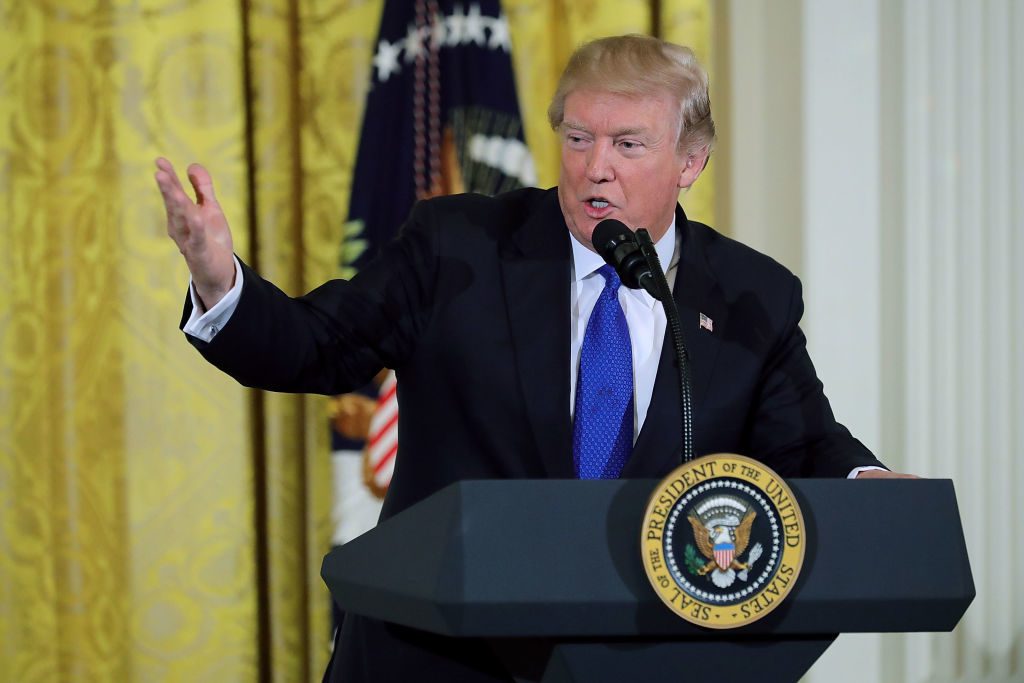
We reached out to our regular contributors for a few thoughts on the big CEO stories of 2018. First up: Yale School of Management’s Jeffrey Sonnenfeld.
The story of how CEOs view President Trump took a sharp turn in 2018, says Sonnenfeld, as the good feelings from last year’s tax reform faded away and his contentious style of politics became a greater source of anxiety.
Sonnenfeld, who runs Yale’s CEO Leadership Institute, says that Trump’s divisiveness was the overwhelming story for CEOs he spoke with in 2018. In a survey of business leaders of large organizations attending the his recent Yale CEO Summit in New York, 75% said they have been forced to apologize to international business partners regarding the President’s diplomatic messages.
“We’ve gone through a cycle with Trump. In 2016, the CEOs of major companies had great skepticism about him. The CEOs of mid-sized companies were quite enthusiastic. They converged in 2017 and all were hopeful. Then we got widespread dismay with his divisiveness and the one-offs of Merck vs. Pfizer, GM vs. Ford, Lockheed vs. Boeing. The contentiousness he was creating in the U.S. business community was remarkable.”
Without the unifying issue of a tax reform, Sonnenfeld says, there was little reason for CEOs to ignore Trump’s divisive behavior in 2018. While most CEOs were interested in updating the North American Free Trade Agreement (NAFTA), as he tried to do, those Sonnenfeld talks to didn’t think it was worth shattering the trust of America’s closest allies. Nearly 90% of the business leaders Sonnenfeld recently polled at his CEO Summit said his negotiation style has cost the nation the trust of its allies.
Another major talking point for CEOs in 2018 was the behavior of what Sonnenfeld calls “the bad kids of tech.” Social networks, such as Facebook and Twitter, were in hot water for their inability to police violent hate speech on their platforms. Almost 80% of CEOs say these social network enterprises should be responsible for hate speech they carry.
While CEOs are split 54-46% on whether tech companies in general need more government oversight, Sonnenfeld feels there is more unification around Twitter and Facebook. “[Those companies] are definitely ostracized by the rest of the U.S. business community, [who feel they are] deserving of oversight because they’ve been unable to properly manage themselves and self-regulate,” he says.
The revelations that Facebook deceived the public and profited on the abuse of private data made it a villain in the eyes of CEOs, Sonnenfeld says. “They willfully denied what they knew, deceived us and tried to pass the buck by setting up smear campaigns against other CEOs.”
The year wasn’t full of just negative feelings. Sonnenfeld says a number of prominent leaders, such as Disney’s Bob Iger, Merck’s Ken Frazier, Dick’s Sporting Goods’ Ed Stack, Walmart’s Doug McMillon, Unilever’s Paul Polman and IBM’s Ginni Rometty, earned the admiration of their peers in 2018. “These are people who have taken very important positions as corporate states-persons, while delivering superb performance.”
One CEO who especially deserves credit, according to Sonnenfeld, is Indra Nooyi, who retired as CEO of Pepsico earlier this year. He says she left on a high note and executed on environmental, social and governance (ESG) initiatives like few others have actually put into practice.
“She was the architect of this performance with a purpose mission. She didn’t just spout the gauzy clichés of ESGs, she delivered on the reduction of a carbon footprint, the elimination of saturated fats and re-balancing the portfolio [to include] healthier foods.”

Chief Executive Group exists to improve the performance of U.S. CEOs, senior executives and public-company directors, helping you grow your companies, build your communities and strengthen society. Learn more at chiefexecutivegroup.com.
0

1:00 - 5:00 pm
Over 70% of Executives Surveyed Agree: Many Strategic Planning Efforts Lack Systematic Approach Tips for Enhancing Your Strategic Planning Process
Executives expressed frustration with their current strategic planning process. Issues include:
Steve Rutan and Denise Harrison have put together an afternoon workshop that will provide the tools you need to address these concerns. They have worked with hundreds of executives to develop a systematic approach that will enable your team to make better decisions during strategic planning. Steve and Denise will walk you through exercises for prioritizing your lists and steps that will reset and reinvigorate your process. This will be a hands-on workshop that will enable you to think about your business as you use the tools that are being presented. If you are ready for a Strategic Planning tune-up, select this workshop in your registration form. The additional fee of $695 will be added to your total.

2:00 - 5:00 pm
Female leaders face the same issues all leaders do, but they often face additional challenges too. In this peer session, we will facilitate a discussion of best practices and how to overcome common barriers to help women leaders be more effective within and outside their organizations.
Limited space available.

10:30 - 5:00 pm
General’s Retreat at Hermitage Golf Course
Sponsored by UBS
General’s Retreat, built in 1986 with architect Gary Roger Baird, has been voted the “Best Golf Course in Nashville” and is a “must play” when visiting the Nashville, Tennessee area. With the beautiful setting along the Cumberland River, golfers of all capabilities will thoroughly enjoy the golf, scenery and hospitality.
The golf outing fee includes transportation to and from the hotel, greens/cart fees, use of practice facilities, and boxed lunch. The bus will leave the hotel at 10:30 am for a noon shotgun start and return to the hotel after the cocktail reception following the completion of the round.